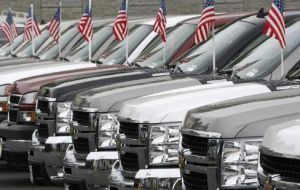MercoPress. South Atlantic News Agency
Republicans oppose US auto industry rescue agreement

The White House and leading Congressional Democrats reached on Wednesday a broad agreement on a 14 billion US dollars rescue package for the “Big Three” US auto manufacturers but Republicans are still holding out.
President Bush administration officials say the tentative agreement covers key points but details still need clarification and Republican Congress members want to stamp their mark on the deal. While the Democrats have a comfortable majority in the House of Representatives, (where the rescue plan was approved late Wednesday 237 to 170), they only have a majority of one in the current lame-duck Senate, so the bill may struggle to get through without extensive amendment. Some Congressional leaders also seem to want some heads of the auto industry roll. "We want to complete this as soon as possible," said Harry Reid, Democratic majority leader in the Senate. "The American people want us to make a decision." General Motors and Chrysler say they risk ruin without immediate aid, while Ford says it may need funds in the future. The original request was for 25 billion USD which then jumped to 35 billion and now has been trimmed to 14 billion. President George W Bush is said to want strict conditions attached to any agreement to bail out the firms, including tough oversight for the three carmakers to ensure that the money is accompanied by sound financial recovery plans. Under the proposal, the government is expected to take non-voting shares in General Motors, Ford and Chrysler. The government is also expected to appoint of a "Car Tsar" to oversee the use of the money. The three firms had been calling for 34 billion US dollars between them, and their bosses recently went before Congress to put their case. GM, Ford and Chrysler have all seen sales fall sharply this year in their home market. While this decline reflects an industry-wide fall that has also hit European and Japanese carmakers in the US, the Big Three have also been criticised for not offering an attractive range of vehicles. They have been said to be too slow in responding to the growing popularity of smaller, more fuel-efficient vehicles. GM admitted on Monday that it had "disappointed" American consumers by letting "our quality fall below industry standards and our designs became lacklustre. The issue is also mired by other considerations such as Senate Banking Committee Chairman Christopher Dodd suggesting General Motors CEO Rick Wagoner should step down if the company receives emergency government loans. "I think he has to move on" Senator Dodd said on CBS's "Face the Nation". In an interview broadcast Sunday on NBC' "Meet The Press," President-elect Barak Obama also hinted that some executives of the auto industry should lose their jobs. "What we haven't seen is a sense of urgency and the willingness to make tough decisions. And what we still see are executive compensation packages for the auto industry that are out of line compared to their competitors, their Japanese competitors, who are doing a lot better," Obama said in the interview. Asked whether the top executives should remain in the jobs, he said: "Here's what I'll say, that it may not be the same for all the companies. But what I think we have to put an end to is the head-in-the-sand approach to the auto industry that has been prevalent for decades now."




Top Comments
Disclaimer & comment rulesCommenting for this story is now closed.
If you have a Facebook account, become a fan and comment on our Facebook Page!